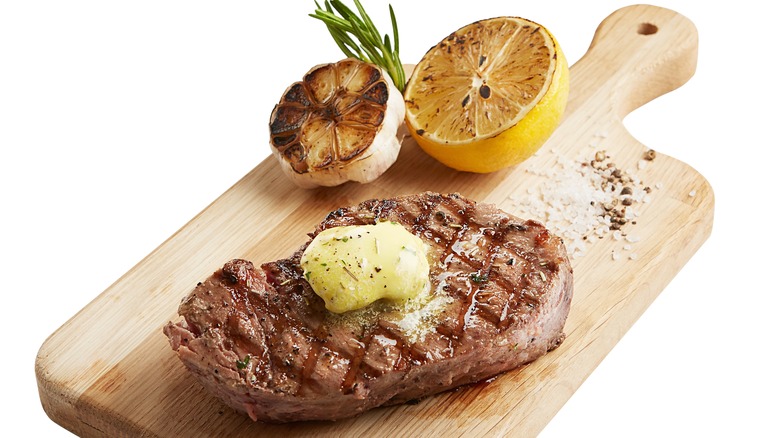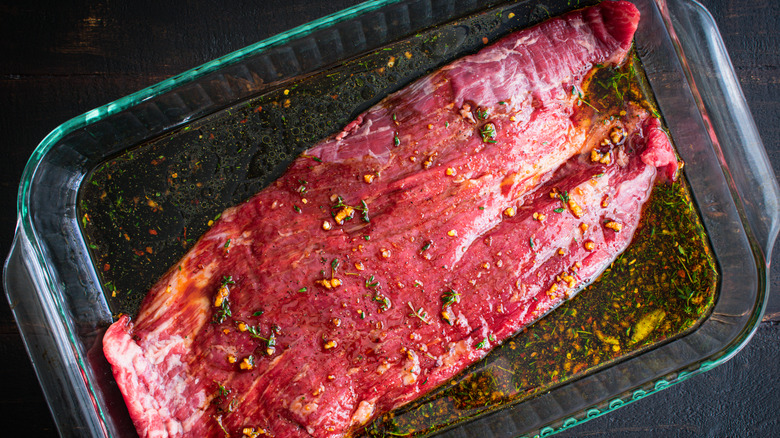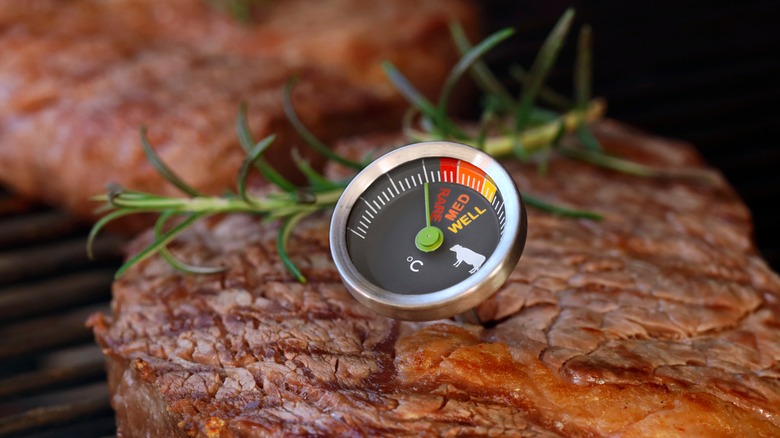How Lemon Juice Makes Steak Scientifically More Delicious
Cooking a steak is an art form; whether at a high-class steakhouse or a home cook's kitchen, tasting the best, mouth-watering piece of meat with a perfect interior conjures the same emotional reaction one may get from looking at Van Gogh's "Starry Night" or hearing Stravinsky's "The Rite of Spring." But for as much artistry is involved, cooking a delicious steak involves an equal amount of science, which — if understood and used properly — can achieve the great and glorious heights of the finest piece of art.
Lemon juice is one unexpected ingredient that can dramatically enhance a steak's flavor. That's because of the biological reaction the human body has when it tastes something sour. The acidity in things like vinegar and citrus fruit increases saliva production. Saliva acts as a solvent for food, triggering taste buds to receive and recognize the various flavors in each bite. The more saliva in the mouth, the more flavor is delivered to the taste buds, which in turn sends signals to the brain that the food being eaten is extremely flavorful. By exploiting this biological fact, a simple spritz of lemon before the first bite of steak or a pad of lemon-infused Cafe de Paris butter melting on top of it will elevate the meat's flavor exponentially.
But lemon doesn't only have an effect on a diner's taste buds; it also has a big effect on the meat itself, making a more tender bite.
Lemon juice acts as a great meat tenderizer during cooking and preparation
When a steak is exposed to heat, it begins a process called denaturing. This means that the proteins are broken down and then reformed into a new structure, resulting in the changing taste and texture of the meat. This, essentially, is what cooking is. The tipping point for denaturing is 130 degrees Fahrenheit. The proteins contract and expel water — the juices — that are often seen seeping out of meat. The more the temperature rises, the more the juices get squeezed out; this is why a well-done steak is tough and sometimes lacks flavor — whereas a medium rare steak is soft, juicy, and flavorful by comparison.
The same exact denaturing process happens when meat is exposed to the citric acid from lemon juice. Using a steak marinade that contains lemon juice will kickstart the denaturing before it hits the searing hot pan. This allows spices like salt, pepper, or rosemary to seep flavor into the meat and, once the sear happens on the outside, traps them and the water in the interior. The end result is a steak packed with flavor.
Lemon juice cuts down on a steak's cooking time
Another added benefit of a lemon-based marinade for steak is that it will cut down on cooking times. Because the denaturing starts prior to cooking, it means that the meat will spend less time in the pan. This is important for two other scientific processes that occur while a steak cooks. The first is fat rendering. Along with water being expelled from the proteins, heat will also start melting the fat in a steak. Fat is one of the primary contributors to a steak's flavor, and as it melts, it seeps out of the meat. A denatured steak will hit its desired temperature quicker, resulting in less fat loss.
The second process that occurs when cooking a steak is called the Maillard reaction. This involves the breakdown of protein and sugar in the meat's surface, ultimately creating the outer crust that is both tasty and helps seal in flavor. Since the protein has already started to break down from the lemon juice, this reaction will kick in faster. Less time on the heat combined with that tasty brown crust equates to more flavor. So the next time something like Aaron McCargo Jr.'s skirt steak is on the menu, it's worth it to bust out the lemon juice. Anyone who eats it will think it's worthy of a museum.



